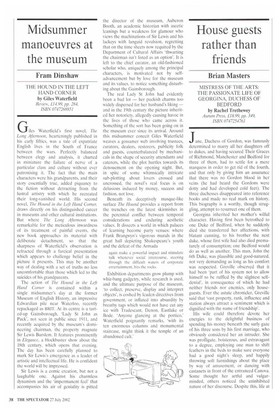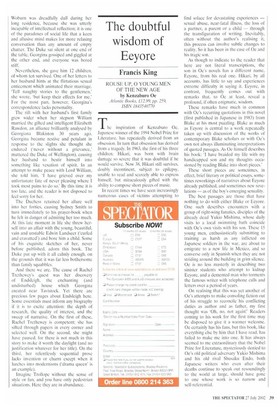House guests rather than friends
Brian Masters
MISTRESS OF THE ARTS: THE PASSIONATE LIFE OF GEORGINA, DUCHESS OF BEDFORD by Rachel Trethewey Aurum Press, £18.99, pp. 349, ISBN 0747254761 Jane, Duchess of Gordon, was famously determined to marry all her daughters off to dukes, and having secured Their Graces of Richmond, Manchester and Bedford for three of them, had to settle for a mere marquess in order to get rid of the fourth, and that only by giving him an assurance that there was no Gordon blood in her veins (he had heard the Gordons were dotty and had developed cold feet). The three duchesses disappeared into reference books and made no real mark on history. This biography is a worthy, though struggling, attempt to resurrect one of them.
Georgina inherited her mother's wilful character. Having first been betrothed to one Duke of Bedford, when he suddenly died she transferred her affections, with blatant cunning, to his brother the next duke, whose first wife had also died prematurely of consumption; one Bedford would do as well as another. This man, John the 6th Duke, was plausible and good-natured, not very demanding as long as his comfort was respected. Greville observed that it had been 'part of his system not to allow himself to be ruffled by the slightest selfdenial', in consequence of which he had neither friends nor enemies, only houseguests. Ever the astute chronicler, Greville said that 'vast property, rank, influence and station always attract a sentiment which is dignified with the name of friendship'.
His wife could therefore devote her energies to the delightful business of spending his money beneath the surly gaze of his three sons by his first marriage, who obviously considered her an intruder. She was profligate, boisterous, and extravagant to a degree, employing one man to shift feathers in the beds to make sure everyone had a good night's sleep, and happily throwing soft furnishings about the place by way of amusement, or dancing with castanets in front of the entranced Canova. Some thought her artful and vulgarminded, others noticed the uninhibited nature of her discourse. Despite this, life at Woburn was dreadfully dull during her long residence, because she was utterly incapable of intellectual reflection; it is one of the paradoxes of social life that a keen and allusive mind makes for more relaxing conversation than any amount of empty chatter. The Duke sat silent at one end of the table. Georgina gossiped and giggled at the other end, and everyone was bored stiff.
Nevertheless, she gave him 12 children, of whom ten survived. One of her letters to her husband hints at the flirtatious sexual enticement which animated their marriage. 'Tell naughty stories to the gentlemen,' she wrote, but keep their effects for me.' For the most part, however. Georgina's correspondence lacks personality.
The rift with her husband's first family grew wider when her stepson William married the gifted and intelligent Elizabeth Rawdon, an alliance brilliantly analysed by Georgiana Blakiston 30 years ago. Georgina became restive and petulant in response to the slights she thought she endured (never without a grievance,' muttered the Duke of Wellington), causing her husband to bestir himself into something like vexation of spirit. In an attempt to make peace with Lord William, she told him, '1 have grieved over my unfortunate late of never pleasing where I took most pains to do so.' By this time it is too late, and the reader is not disposed to feel sorry for her.
The Duchess retained her allure well into her forties, causing Sydney Smith to turn immediately to his prayer-book when he felt in danger of admiring her too much. At this late moment in life she threw herself into an affair with the young, beautiful, vain and unstable Edwin Landseer ('curled and cravatted') and bore him a child. Some of his exquisite sketches of her, never before published, adorn this book. The Duke put up with it all calmly enough, on the grounds that it was far less bothersome than family squabbles.
And there we are. The cause of Rachel Trethewey's quest was her discovery of Endsleigh, the enchanting (and undisturbed) house which Georgina created near Tavistock. Yet there are precious few pages about Encisleigh here. Some essentials must inform any biography if it is to excite attention: the depth of research, the quality of interest, and the sweep of narrative. On the first of these, Rachel Trethewey is competent; she has sifted through papers in every corner and selected well. On the second, she might have paused, for there is not much in this story to make it worth the daylight (and no justification whatever for her title). On the third, her relentlessly sequential prose lacks invention or charm except when it lurches into modernisms ('drama queen' is an example).
Imagine Trollope without the sense of style or fun, and you have only pedestrian situations. Here they are in abundance.

































































 Previous page
Previous page